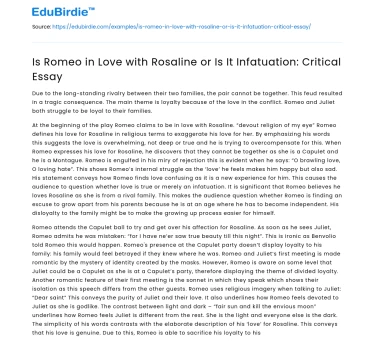Introduction
Romeo Montague, the quintessential romantic figure in William Shakespeare's "Romeo and Juliet", is often perceived as a character driven by passionate emotions. The debate over whether his feelings for Rosaline constitute genuine love or mere infatuation has been a subject of scholarly interest. This essay aims to explore Romeo's initial affection for Rosaline and assess whether it reflects true love or youthful infatuation. By examining Shakespeare's characterization of Romeo, the nature of his attraction to Rosaline, and the broader context of Elizabethan notions of love, we can better understand the complexities of Romeo's emotional state. Additionally, addressing counterarguments will provide a nuanced perspective on this enduring question, contributing to a more comprehensive interpretation of Shakespeare's work.
Romeo's Emotional State: An Analysis
To comprehend whether Romeo's feelings for Rosaline are genuine love or infatuation, it is crucial to analyze his emotional state at the beginning of the play. Romeo's description of his feelings for Rosaline is characterized by melodramatic expressions and a sense of idealized longing. For instance, in Act 1, Scene 1, Romeo mourns, "Why, then, O brawling love! O loving hate!" (Shakespeare, 1.1.176). This oxymoronic language reflects the turbulence and confusion typical of infatuation rather than the stability associated with true love. Moreover, his obsession with Rosaline's beauty, as highlighted in his lamentation, "O, she is rich in beauty, only poor" (Shakespeare, 1.1.197), suggests a superficial attraction rather than a deep emotional connection.
Save your time!
We can take care of your essay
- Proper editing and formatting
- Free revision, title page, and bibliography
- Flexible prices and money-back guarantee
The intensity and volatility of Romeo's feelings indicate a youthful infatuation. According to psychologist Dorothy Tennov, infatuation is characterized by an obsessive fixation and idealization of the object of affection, often devoid of deeper emotional understanding (Tennov, 1979). Romeo's inability to articulate any substantive qualities about Rosaline apart from her beauty supports this notion. Furthermore, Romeo's rapid emotional transition from despair over Rosaline to enamoration with Juliet upon first sight implies a lack of depth in his initial feelings. Thus, the evidence suggests that Romeo's affection for Rosaline is more aligned with infatuation than with a mature, enduring love.
Elizabethan Perspectives on Love
Understanding the Elizabethan context is essential to evaluating Romeo's feelings for Rosaline. During Shakespeare's time, love was often depicted as a multifaceted concept, encompassing both courtly love, which emphasized chivalry and idealization, and romantic love, which involved mutual affection and partnership (Fineman, 1986). Romeo's behavior aligns with the traditions of courtly love, where unrequited affection and suffering were common themes. His lamentations and poetic expressions fit the mold of a courtly lover pining for an unattainable object. However, this form of love was frequently criticized for its lack of substantive emotional connection.
Moreover, the rapidity with which Romeo's affections shift to Juliet challenges the notion of a deep-seated love for Rosaline. In Act 1, Scene 5, upon seeing Juliet, Romeo declares, "Did my heart love till now? Forswear it, sight! For I ne'er saw true beauty till this night" (Shakespeare, 1.5.51-52). This immediate transfer of affection underscores the superficiality of his earlier infatuation with Rosaline. While some might argue that this shift reflects the capricious nature of love, it is more indicative of a youthful susceptibility to infatuation, a common occurrence in Elizabethan portrayals of young lovers.
Counterarguments and Rebuttals
Despite the prevailing argument that Romeo's feelings for Rosaline are infatuation, some scholars suggest that his emotions may represent a form of genuine love. They argue that Romeo's poetic expressions and deep sorrow reflect a sincere emotional investment. However, this perspective fails to account for the lack of any meaningful interaction or emotional reciprocity between Romeo and Rosaline. Unlike his relationship with Juliet, which develops through shared experiences and mutual understanding, Romeo's affection for Rosaline is unreciprocated and largely fantasized.
Furthermore, critics might posit that Romeo's idealization of Rosaline serves as a narrative device to highlight his emotional growth and capacity for true love with Juliet. While this is a valid interpretation, it reinforces the notion that his initial feelings for Rosaline are based on infatuation rather than genuine love. The contrast between his superficial attraction to Rosaline and the profound connection he forms with Juliet underscores the transformative power of authentic love in Shakespeare's narrative.
Conclusion
In conclusion, Romeo's feelings for Rosaline in "Romeo and Juliet" embody the characteristics of infatuation rather than genuine love. His dramatic expressions, focus on Rosaline's beauty, and rapid shift of affection to Juliet reveal a superficial and idealized attraction. The Elizabethan context further supports this interpretation, as courtly love often emphasized unreciprocated and idealized affections. While counterarguments suggest a possibility of true love, the lack of emotional depth and reciprocity between Romeo and Rosaline undermines this claim. Ultimately, Shakespeare's portrayal of Romeo's emotional journey serves as a testament to the complexity of youthful passion and the distinction between infatuation and true love.






 Stuck on your essay?
Stuck on your essay?

